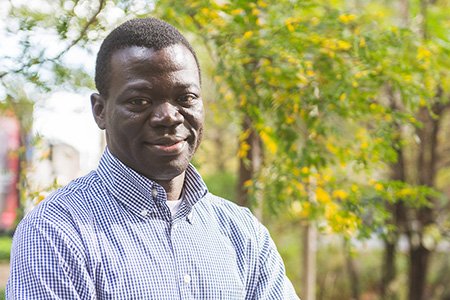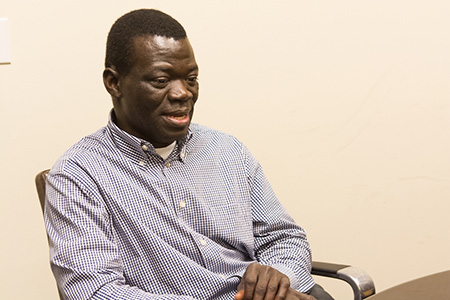Lost Boy of Sudan an Emerson student

William Kohl Muorwel ’17 was 8 years old when his Sudanese village was attacked by soldiers, causing him and scores of others to flee while encountering horrible atrocities. Now, Muorwel is enrolled at Emerson College, where he wants to learn about audio/visual production and share his story with fellow students. (Photo by Michelle Kwong ’15)
William Khol Muorwel ’17 began an extraordinarily brutal chapter of his life at 8 years old—driven out of his native Sudanese village by murderous government soldiers during the country’s second civil war—when he became one of 20,000 “Lost Boys of Sudan.”
Now, at age 35, he’s embarking on a much more empowering aspect of his life at Emerson College, where he is a sophomore studying television production in the Visual and Media Arts program.
“Promising myself to get an education is what keeps me going,” Muorwel said. “I came to Emerson to learn, and also to share my story. I wanted to do something to keep this story alive.”
On Monday, October 20, at 2:00 pm in the Bright Family Screening Room of the Paramount Center, Muorwel will share his harrowing story with the Emerson community in a discussion as part of a screening of The Good Lie, a new film starring Reese Witherspoon and produced by Ron Howard.
The Good Lie focuses on a group of refugees, including three siblings who were part of the Lost Boys—a term dubbed by aid workers for the thousands of boys displaced or orphaned during the civil war, which lasted from 1983 to 2005. (The film The Lost Boys of Sudan on the same topic was released in 2003.)
“This movie (The Good Lie) is telling the public exactly what happened and how did we get here,” said Muorwel, who transferred to Emerson from Bunker Hill Community College.
Muorwel and two other Lost Boys who live in the Boston area, Moses Ajou and Ayuel Agany, will hold a discussion with the student audience.
Muorwel has lived just outside Boston since 2001, and since 2002 has worked at the Marriott Copley Hotel, where he does both catering and audio/visual work.
“Since I came here, I started to work and I’ve been working ever since,” Muorwel said. “Everybody keeps advising me that you’re doing the right thing, to stay focused.”
After enduring a life with horrors difficult to contemplate, Muorwel and several Lost Boys received immigration sponsorship from the International Institute of Boston.
“It was going to be our happiest moment,” Muorwel said.
Their plane took off the morning of September 11, 2001—and was in mid-air when the terrorist attacks occurred—causing the men to be temporarily detoured to Canada.
“We thought, ‘Is war following us?’” he said.
Muorwel’s life of fleeing from conflict began in 1987 when northern Sudanese soldiers stormed his home village of Wulu, in southern Sudan. Muorwel joined a group of young boys running for safety toward the Bahr el Naam River.
He would be separated from his parents for nine years.
The boys traveled a long and tragic road to Ethiopia, enduring many casualties due to lack of food, clean water, and attacks by wild animals.
In the blazing heat, Muorwel and thousands of young boys walked barefoot for three years, for thousands of miles, with only the clothes on their backs before reaching a refugee camp in Ethiopia.
“A lot of people died,” he said.

William Khol Muorwel ’17 shares his experiences in a recent interview. (Photo by Michelle Kwong ’15)
Muorwel said his most unforgettable experience came in 1991, when the Lost Boys were displaced from their refugee camp in Ethiopia due to that country’s political crisis. The boys were attempting to cross the Gilo River when the water began to rise.
“The current was moving fast,” he said. “At the time, we didn’t have a choice. We don’t have guns. We don’t have anything to defend ourselves. And the Ethiopian rebels are shooting at us, so we have to cross the river.”
A large number of refugees did not know how to swim; crocodiles attacked; and many died.
“I don’t know how to describe it,” Muorwel said. “It was the moment that you can really see the world is different.
“That is not something I will ever forget,” he said. “It’s very emotional.”
Despite the tragic details, Muorwel said he’s looking forward to answering students’ questions on October 20.
“The most important thing about the story is the positive part about coming to America,” he said. “Most of the people who came here in 2001, they continued their education. There are people who graduated with their master degrees…who are medical doctors. You see a lot of success in most of the Lost Boys.”
The October 20 screening and discussion is sponsored by Communication Studies. Senior Scholar-in-Residence Cathryn Edelstein will facilitate the discussion in association with her intercultural communication course.
Categories